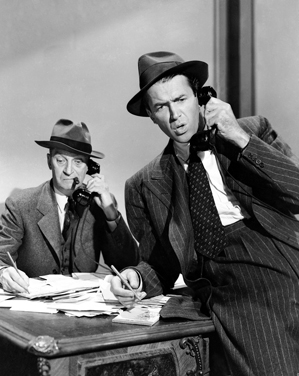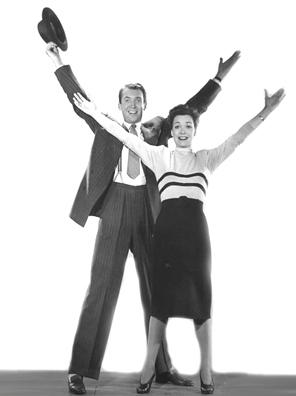
 |
|
|
|
1947's Magic Town is an underachieving James Stewart comedy-drama unofficially known as the Frank Capra film that Frank Capra didn't make. It was written and co-produced by Robert Riskin, who wrote or co-wrote some of Capra's biggest hits of the 1930s: It Happened One Night; Mr. Deeds Goes to Town; Lost Horizon. After Meet John Doe Riskin professed frustration with his director's habit of hogging credit. According to Hollywood legend, Riskin brandished a blank page in Capra's face and suggested that he, "Put the famous Capra touch on that!" As is well known, after WW2 the Capra-corn brand of whimsical populism began to fall out of favor with audiences. He independently produced the now revered It's a Wonderful Life, but new tax laws made finding a profit nearly impossible. Robert Riskin also took the plunge into producing, partnering with director William A. Wellman. Together they made the very Capra-like Magic Town, which would seem to have all the elements to please an audience, yet misses the mark by a mile. Something essential in the film does not click, even as it fascinates. 
The story is yet another of Riskin's populist fables. New York pollster Rip Smith (James Stewart) wants to generate national poll results more efficiently. Opinion survey companies must maintain a vast network of poll takers across the country; Rip's plan is to identify a 'perfect' hamlet whose demographics happen to be a microcosm of the nation as a whole. He finds his 'magic town' in a quiet community called Grandview, and sets up shop pretending to sell insurance. Rip's partner Ike (Ned Sparks) helps to gather the first poll, which indeed 'magically' aligns with the opinion of the entire nation. Rip overhears a city council meeting in which newspaperwoman Mary Peterman (Jane Wyman) proposes changes to modernize Grandview. As Rip's plan requires that the town stay exactly the same, he quashes Mary's plan with an impassioned speech about traditional values. Despite her initial hostility, Rip and Mary hit it off. He doesn't tell her that he has no intention to live in Grandview. Rip coaches the basketball team to success and becomes the town's most popular new citizen. He doesn't realize the depth of his dishonesty until he's honored at a big party. When Mary discovers what's going on, she uses her newspaper column to blow Rip's scheme wide open. But her gesture backfires -- Grandview's 'special' status is trumpeted across the country. Convinced that they're superior to outsiders, the locals swell with self-importance. Greed takes over as thousands of new citizens flock to town. Property values soar in a false bubble of speculation. With the drastic changes to Grandview, its opinions no longer reflect anything useful to a pollster. Only a few weeks later, the town is a national joke. It faces economic disaster and a collapse of morale. Magic Town didn't connect with postwar audiences, who were more in tune with the sober realism of features like The Best Years of Our Lives. It has the same faults as Capra's populist fairy tales but lacks the performance twinkle that Capra could conjure. The leading players exchange heartwarming looks and engage in relentlessly cute behaviors. Ms. Wyman is allowed some dignity but James Stewart's aw-shucks posing comes fast and thick. One little gag has Rip caught by some indignant old ladies with his pant leg rolled up. He shakes it down, an amusing bit of business. But he then spoils the moment with a second cute leg gesture as he walks away. For all the effort, the romance is lacking as well. Riskin and Wellman invent reams of cute business for Stewart and Wyman to perform, yet there isn't an ounce of chemistry between them. All Donna Reed had to do in Wonderful Life is breathe, and Stewart's body temperature soared. We could feel it. Wyman comes off as an ice cube, and Stewart a concept that isn't working. 
The oversimplified story preaches that wholesome rural virtues will always trump corrupt city-slicker values. Director Wellman addressed this issue hilariously in his screwball comedy Nothing Sacred, where the hicks are shiftier than the city folk and just as greedy. Their dogs bite, too. Some critics say that director Wellman was better suited for this sort of satire, but he was quite capable of excelling with sentimental subject matter. The truth is that Magic Town pushes too hard to tell us how adorable everyone is, even Grandview's do-nothing mayor. The complexities of real life are kept at arm's length. Again, this attitude was not in keeping with the postwar mood. Riskin's city planning scene is Kindergarten stuff compared to the subtle struggle for power and profit in a similar scene in the same year's Boomerang! Capra and Riskin earlier movies concocted a Capracorn Universe in which ordinary people are amusing but irrelevant. Cast to make immediate but shallow impressions, the many bit players were either over-sentimentalized non-entities, or clownish hicks, each allowed one cute character trait. A number of Capra's bit players are present here, but none are very fresh in their roles. The newspaper office has a cute model railroad set, and its three amusing newspapermen are always arranged like ducklings in a row. Everybody is nice, few people think for themselves. The local kids immediately worship Rip as some kind of super-celebrity. The local muckety-mucks are too stupid to be grafters, and Rip effortlessly takes over as the town's leading mover & shaker. The Rip Smith character is self-contradictory. He's a clever sharpie from the city, but also a creampuff George Bailey clone, a natural civic leader who loves kids and charms his way into Mary's heart. Stewart's George Bailey in Wonderful Life is a conflicted fellow, hiding an inner frustration and rage. He faces the same kind of grinding life problems we all know -- unfairness, economic trouble. He's one of us. By contrast Rip Smith is an enemy agent who slips into town to harvest Grandview's opinions for use back on his home turf, the big city. He doesn't realize that he's an exploiter until the locals elevate him to the status of beloved newcomer. Rip is comparable to Van Heflin's Confederate spy in 1954's The Raid, the terrorist that comes to a Vermont town to prepare a guerilla attack. While setting his trap, Van Heflin accidentally becomes a town hero and is showered with civic accolades and gifts. Rip is given identical treatment at a big town party, for winning the ball game. The town thinks he's going to put down roots, and he feels like an All-American Heel. Jane Wyman's Mary Peterman feels a strong loyalty to Grandview. She's an unselfish progressive yet cherishes the traditional qualities that will disappear as Grandview expands and develops. The town's civic life revolves around a beloved meeting room, where the local Senator comes to hear what people think. Instead of Wonderful Life's banister with a loose knob, the meeting room has a pot bellied stove with a broken hinge. For Mary, it's a symbol of what's precious about the old Grandview. Her idea of great entertainment is to climb a tall hill and lay down in the grass. As in the much later Pleasantville, change will take Grandview out of Norman Rockwell Land, into an unpleasantly unpredictable reality. Riskin's script grossly exaggerates the chaos of the Magic Town boom and the big-bust depression that follows. Mary's one newspaper article leads to a land speculation rush and a stampede of new citizens eager to get in on the aura of living in a perfect town. When that illusion is crushed, Grandview becomes a national joke. The citizens no longer show their faces. The streets become dark and grim, with trash blowing in the gutters. This pessimistic image of America seems totally unjustified. Wyman compares her romantic impasse with Stewart to a story exactly like the film noir Double Indemnity, except that they haven't killed a husband, they've killed a whole town. The whirlwind montage of crass 'Magic Town' exploitation is almost as dispiriting as the mob of sadistic-sympathetic carnival goers in Billy Wilder's vitriolic Ace in the Hole. 
The unpleasant ending shows writer Riskin embracing the worst of '30s Capracorn. The demigods Stewart and Wyman use subterfuge and emotional extortion to steer the locals to the 'right' decision. Rip even sets the town's kids against their own parents. Citizen bit players Regis Toomey and Ann Doran 'magically' realize that the way to restore Grandview is for everybody to pitch in and contribute free services and goods. Rip is in ecstasy as the townies leap into an orgy of good citizenship and civic altruism. This may just may be the most insultingly false "happy ending" in any American movie, ever. And that's a shame because Magic Town is well directed and nicely shot. Many of Riskin's dialogue scenes are smartly turned out. The basic idea of how polls work will be of interest to anybody working in the fields of public opinion or marketing. Rip Smith's Grandview experiment is now a fundamental function in today's "information age", the involuntary harvest of data from each and every one of us, for profit and influence. Buried in the film's chaotic "hell town" montage is a great bit in which the locals decide to sell their opinions instead of give them away. The film considers them fools for thinking their silly opinions have a market value. Yet Rip makes his living with these same silly opinions. Is this the film's comment on the myth of Democracy? 1 Not that Magic Town should be held to account, but its idea of an outrageous, useless polled opinion comes when a majority of Grandview citizens declare that, yes, they would indeed vote for a woman president. Olive Films' Blu-ray of Magic Town is a beautiful, flawless transfer from an element that must have been kept in perfect storage for 67 years. Every meaningful look and coy eye-twinkle exchanged between Stewart and Wyman pops off the screen. We greatly admire cinematographer Joseph Biroc's smooth camerawork and the expensive-looking small town sets, most all of which are interiors. Magic Town is a unique example of quality filmmaking that stubbornly refuses to gel into a satisfactory whole. It's a fascinating study film.
On a scale of Excellent, Good, Fair, and Poor,
Magic Town Blu-ray rates:
Footnotes:
1. It's too big of a deal to go into in detail, but more than one critic claims to have detected a thread of fascist sympathies running through some of the big Frank Capra movies, a notion that charismatic natural leaders should be in charge of America instead of qualified professionals and elected, but corrupt, insiders. Gary Cooper's Longfellow Deeds in Mr. Deeds Goes to Town responds to people he doesn't like (including smart-aleck New York elitists) by socking them in the nose. The movie says he's entitled to do this, as he's a Real American and knows what's right by sheer instinct. Deeds is so charismatic, he inspires waves of followers, none of whom would describe themselves as sheep-like minions. He's as much a threat to Democracy as Meet John Doe's official villain, a politico played by Edward Arnold.
Reviews on the Savant main site have additional credits information and are often updated and annotated with footnotes, reader input and graphics.
Review Staff | About DVD Talk | Newsletter Subscribe | Join DVD Talk Forum |
| ||||||||||||||||||